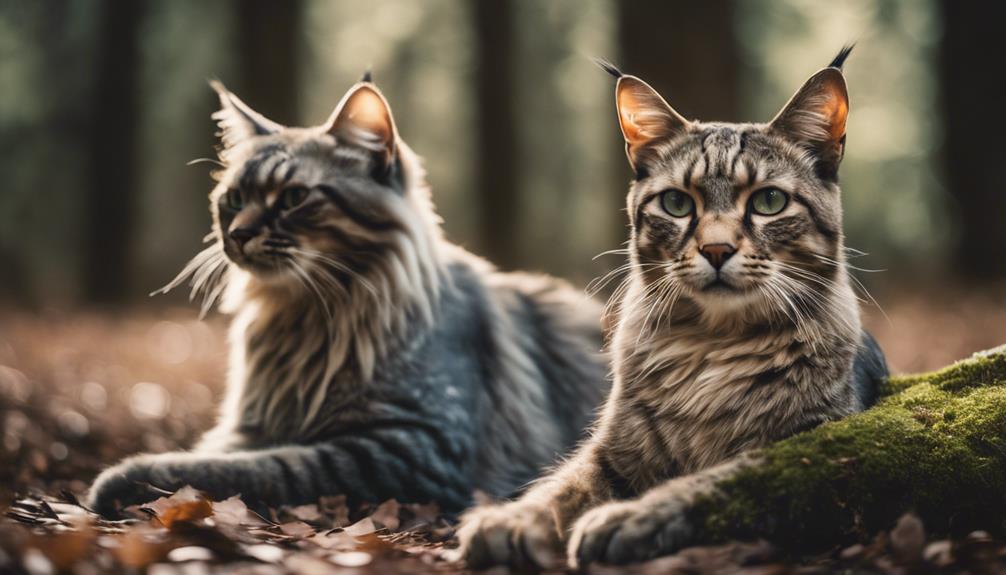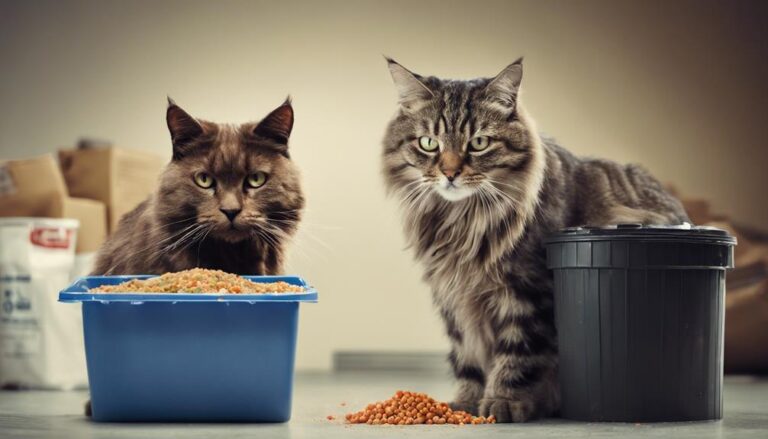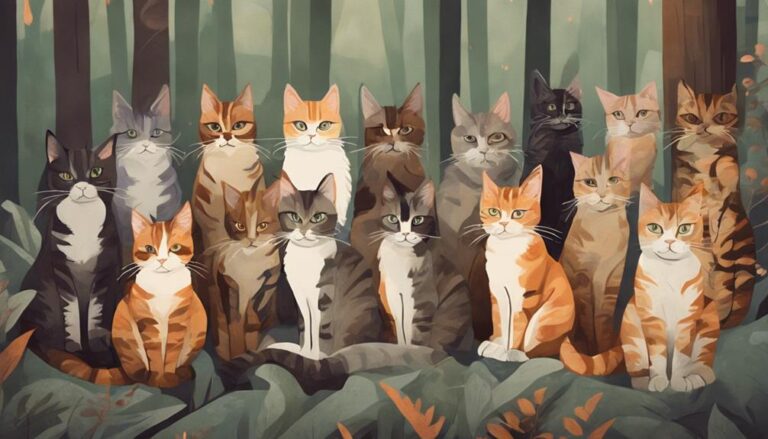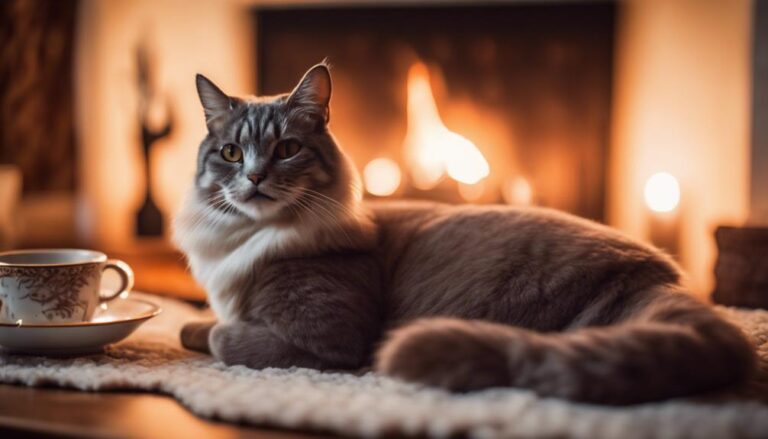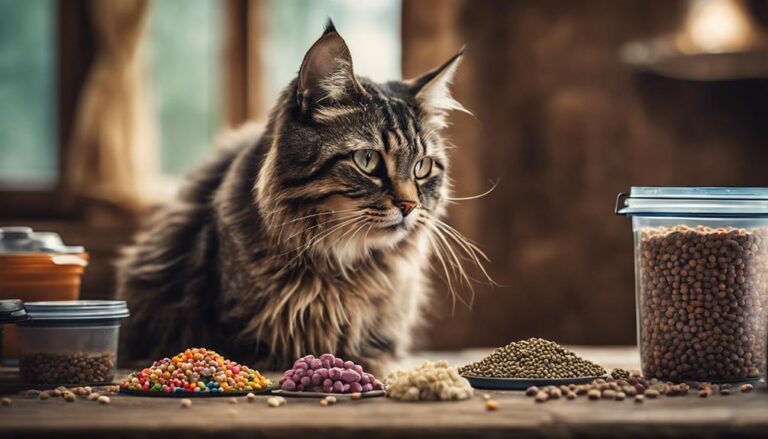You've likely heard the claim that Maine Coons are part lynx – it's a notion that's been circulating for years. But have you ever stopped to think about where this idea came from? You're probably familiar with the breed's rugged good looks and distinctive ear tufts, which do bear a resemblance to those of their wild cousins. But is there any truth to the myth? As you're about to find out, the answer might surprise you – and it's rooted in a fascinating story of history, genetics, and the complex relationships between wild and domesticated animals.
Debunking the Lynx Myth
Since the origins of the Maine Coon breed, many have speculated that these majestic felines are part lynx, but is there any truth to this claim? You've probably noticed that Maine Coons have a wild look, with their distinctive shaggy coats and ear tufts that resemble those of their wild cousins. It's no wonder that people assume they must have some lynx blood in them. However, despite their rugged appearance, Maine Coons are 100% domestic cat.
You might be thinking, "But what about their ear tufts? Don't those prove they're part lynx?" Not quite. While it's true that lynxes have ear tufts, it's not a unique feature to them. Many domestic breeds, including the Maine Coon, have developed ear tufts as a result of natural selection. It's simply an adaptation to help them hear better in the cold, snowy climates they originated from. And as for the genetics, it's genetically impossible for a domestic cat to breed with a lynx, let alone produce viable offspring. So, while Maine Coons may look like they have a touch of the wild, they're purely domestic felines through and through.
Origins of the Maine Coon
You're likely curious about where these magnificent creatures came from, and the origins of the Maine Coon are shrouded in mystery and myth. As one of the oldest natural cat breeds in North America, the Maine Coon's history is rich and varied. One theory suggests that they descended from long-haired cats brought over by European sailors and settlers. Another theory proposes that they're related to cats owned by Marie Antoinette, who were smuggled out of France during the Revolution and eventually made their way to Maine.
Despite the unclear origins, one thing is certain – the Maine Coon has been a beloved and iconic cat breed for centuries. Their large paws, rugged coat, and impressive size made them perfect for surviving the harsh New England winters. Over time, they've become an integral part of Maine's history and culture, with many considering them the official state cat. As you dig deeper into the world of Maine Coons, you'll discover a loyal and affectionate companion that's captured the hearts of many.
Physical Characteristics Explained
Your Maine Coon's physical characteristics are a tribute to their rugged heritage, with a sturdy muscular build, broad chest, and strong legs that resemble those of their wild ancestors. These features allow them to navigate rough terrain with ease, making them well-suited for their original purpose as farm cats. Their large paws, complete with tufted fur between the toes, act as natural snowshoes, enabling them to move effortlessly through deep snow. You'll also notice their distinctive shaggy coat, which is water-resistant and designed to keep them warm in freezing temperatures.
Their facial features are equally impressive, with a strong, chiseled muzzle and piercing eyes that seem to hold a hint of wildness. Their ears are large and wide at the base, giving them exceptional hearing abilities. Overall, your Maine Coon's physical characteristics are a legacy to their adaptability and resilience, making them a true marvel of nature. By examining these traits, it's clear that they share many physical similarities with their wild cousins, further fueling the debate about their potential lynx ancestry.
The Dangers of Wild Cats
As you venture into the wilderness, the presence of wild cats looms, their untamed power and stealthy nature posing a threat to human safety. These felines are not domesticated, and their instincts are honed for survival, not companionship. You may think they're beautiful or majestic, but don't be fooled – they're wild animals that can inflict serious harm.
When encountering a wild cat, crucially, you must keep a safe distance.
- Infectious diseases: Wild cats can carry diseases like rabies, which can be transmitted to humans through bites or scratches.
- Aggressive behavior: When feeling threatened or cornered, wild cats can become aggressive, leading to attacks on humans.
- Unpredictability: You can't anticipate the behavior of a wild cat, making it difficult to react appropriately in an encounter.
The Truth About Hybridization
You're likely curious about the claims surrounding Maine Coon hybridization, and you've probably heard some wild stories. But what's fact and what's fiction? Let's separate the truth from the myths and explore the real deal about hybridization, including the results of lynx DNA testing and the authenticity of wild ancestry claims.
Hybridization Myths Debunked
Debunking the myth of hybridization between Maine Coons and lynxes requires a closer look at the genetic makeup of these animals. You might have heard claims that Maine Coon breeders crossed their cats with lynxes to create the distinctive physical characteristics of the breed. However, this is simply not supported by scientific evidence.
In reality, the genetic differences between domestic cats and lynxes are significant, making interbreeding highly unlikely. Here are three key reasons why hybridization between Maine Coons and lynxes is not possible:
- Chromosomal incompatibility: Domestic cats have 38 chromosomes, while lynxes have 50. This significant difference makes it impossible for the two species to produce viable offspring.
- Reproductive barriers: Even if a Maine Coon and a lynx were able to mate, the resulting embryos would likely not be viable due to differences in reproductive biology.
- Genetic distance: The genetic differences between domestic cats and lynxes are too great for hybridization to occur naturally.
These facts confirm that Maine Coons are not, and have never been, the result of hybridization with lynxes. So, where did their distinctive characteristics come from? That's a story for another time.
Lynx DNA Testing
While exploring the myth of Maine Coon-lynx hybridization, you may have wondered if DNA testing could uncover any evidence of lynx ancestry in these majestic cats. You're not alone in your curiosity. Many researchers and breeders have attempted to use DNA testing to settle the question once and for all. Unfortunately, the results have been inconclusive at best.
The main issue lies in the fact that there's no reliable DNA test specifically designed to detect lynx ancestry in domestic cats. Commercial DNA tests, like those used for human ancestry or pet DNA profiling, are not equipped to detect the subtle genetic differences between domestic cats and wild lynx. Even if they were, the genetic markers unique to lynx would likely be diluted or lost due to the many generations of breeding that have shaped the Maine Coon breed.
In short, DNA testing is not a reliable method for determining whether Maine Coons have lynx ancestry. While it's an intriguing idea, the science just doesn't support it. You'll need to look elsewhere for answers about the origins of this beloved breed.
Wild Ancestry Claims
As you explore into the history of Maine Coons, you'll likely come across claims of wild ancestry. But what's behind these claims, and can they be substantiated by historical records and biological facts? Claims of wild ancestry in Maine Coons often revolve around the idea of hybridization, but what's behind these claims, and can they be substantiated by historical records and biological facts?
One theory suggests that early European settlers brought long-haired cats to North America, which then interbred with native wild cats, such as lynxes or bobcats. This supposed hybridization resulted in the distinctive characteristics of the Maine Coon breed. However, there's no concrete evidence to support this theory. In fact, most historians and biologists agree that:
- There's no record of early settlers bringing long-haired cats to North America.
- Native wild cats weren't common in the regions where Maine Coons originated.
- The genetic makeup of Maine Coons doesn't show any significant influence from wild cat species.
These facts raise serious doubts about the hybridization theory. So, what's the real story behind the Maine Coon's origins? Let's explore further to uncover the truth.
Separating Fact From Fiction
You've likely encountered claims that Maine Coon cats are part lynx, but vital to separate the myth from the science. These claims often stem from the breed's unique physical characteristics, such as their large size, tufted ears, and bushy tail. While it's true that these features resemble those of lynxes, key to look beyond superficial similarities.
In reality, there's no scientific evidence to support the claim that Maine Coons are part lynx. Genetic studies have consistently shown that Maine Coons are a domesticated breed, descended from European longhair cats brought to North America by early settlers. Their distinctive appearance is the result of natural selection and selective breeding, not hybridization with wild lynxes.
Frequently Asked Questions
Is a Maine Coon Part of Lynx?
You're wondering if a Maine Coon is part of a lynx, and rightfully so, given their striking resemblance. However, despite their similarities, Maine Coons are domestic cats, not hybrids, and their lynx-like features are just a result of natural evolution.
Do Maine Coons Always Have Lynx Tips?
You're wondering if Maine Coons always have lynx tips, but the answer is no, they don't. While some Maine Coons have lynx-like tufts on their ears, it's not a breed standard or a guarantee.
What Two Breeds Make a Maine Coon?
You're wondering what breeds create a Maine Coon. Well, you're in luck! They're a mix of domestic longhair cats and native North American shorthairs, specifically the domestic cat and the North American wildcat, which makes them so unique and lovable.
Is a Maine Coon Part Raccoon?
You're wondering if a Maine Coon is part raccoon, but the answer is no, they're not. Despite their size and bushy tail, genetic testing proves they're a domestic breed with no raccoon DNA.

